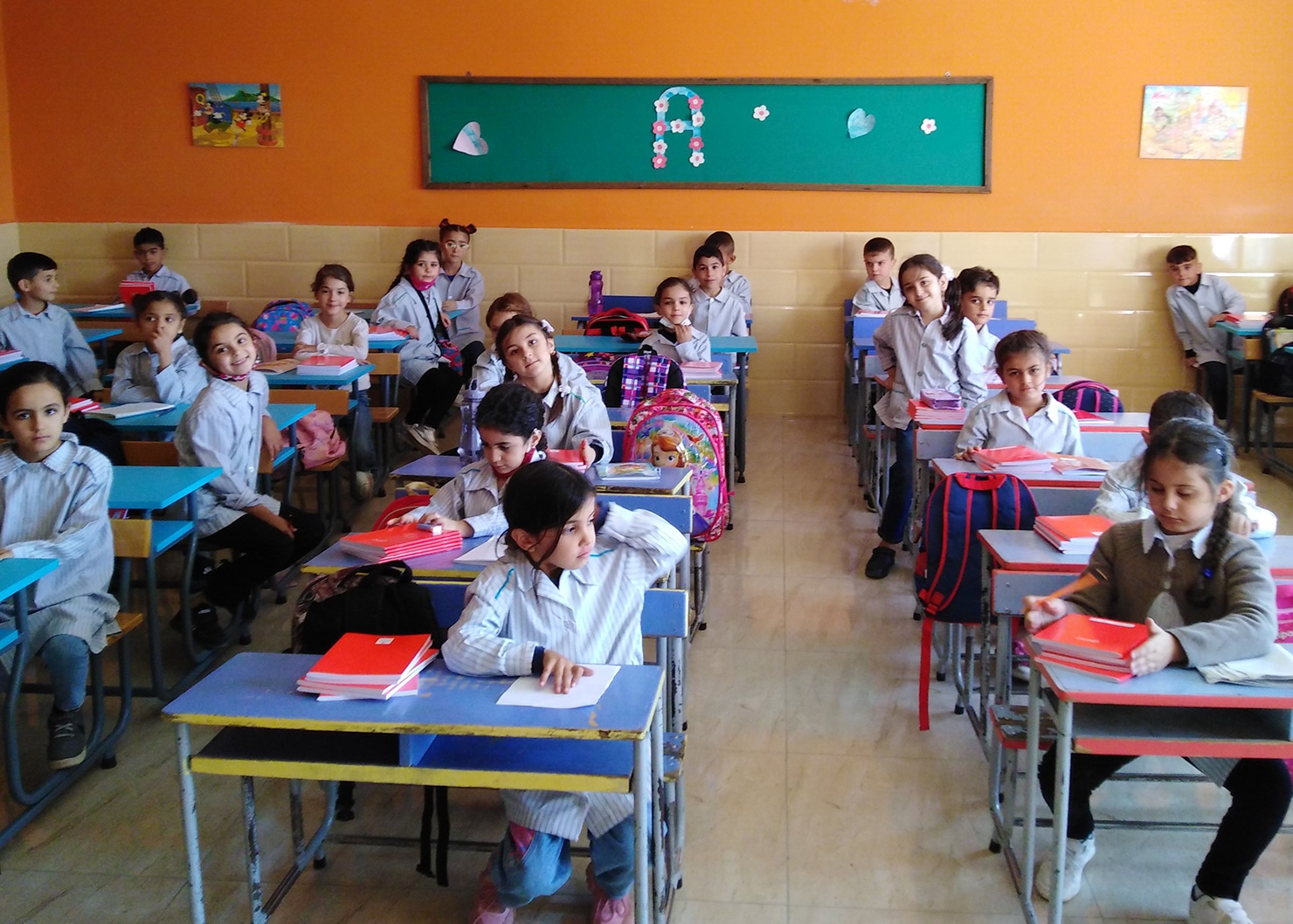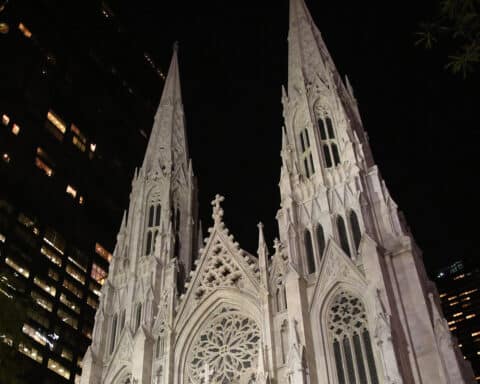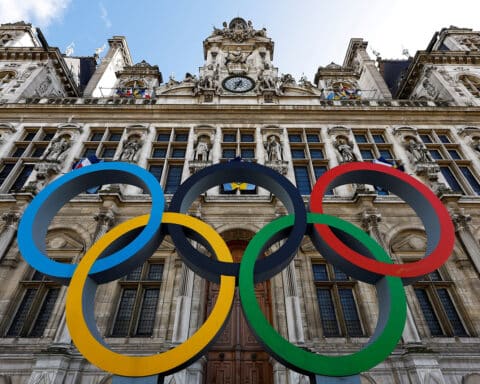BEIRUT, Lebanon (OSV News) — Inscribed at the entrance to the headquarters building for the general secretariat of Catholic schools in Lebanon is St. John Paul II’s acclamation about the Land of Cedars: “Lebanon is more than a country. It is a message of freedom and an example of pluralism for East and West.”
“In our Catholic schools, we are putting into action what John Paul II said,” said Melkite Father Youssef Nasr, president of the general secretariat for Catholic schools in Lebanon.
More than 30% of the students in the country’s Catholic schools are non-Christian, he said. In some areas of Lebanon, Muslim enrollment in Catholic schools reaches as high as 90%.
“Our Catholic schools give Lebanese students from different communities the opportunity to stay together, to know each other, to build good relations with each other. This is coexistence,” Father Nasr told OSV News.
“What distinguishes our Catholic schools is that they continue to offer a secure environment regarding values, traditions and principles. Parents know what we are teaching to their children, what our values are, and so they are happy to send their children to our schools,” Father Nasr pointed out.
High academic standards
Lebanon’s Catholic schools are known for high academic standards, with students typically learning in Arabic, French and English.
The country has over 300 Catholic schools, which educate some 200,000 students. Ninety of those schools, located in the poorest rural and urban regions, are designated as partially government-subsidized. But the state has not paid any such subsidies since 2016.
All the schools are navigating stormy seas as Lebanon sinks under a debilitating economic crisis, deemed by the World Bank as one of the worst globally in modern times. Since 2019, the national currency has lost 98% of its value. Poverty has overtaken 80% of the population in the once middle-income country.
“Our Lebanese people are suffering. There is a huge suffering,” Father Nasr said.
In 2020, the general secretariat had sounded the alarm that 80% of Catholic schools were in danger of closing “because of the economic situation and the neglect of the state in the performance of its duties,” the priest said.
That dire outcome was averted, largely due to support from international Catholic aid organizations and Lebanese in the diaspora.
Father Nasr in particular cited the help of Aid to the Church in Need, the Catholic Near East Welfare Association, or CNEWA, and the French Catholic charity L’oeuvre d’Orient.
“Without them, we couldn’t continue our mission. They played a big role in sustaining our schools, and we thank them,” Father Nasr told OSV News. “We count on more help in this next year because of the big need of the poorest Lebanese,” he added.
“The big challenge for the beginning of this school year is how can we help the poorest Lebanese to enroll their children in our Catholic schools,” Father Nasr said.
Retaining and supporting teachers
Under Lebanon’s crushing economy, the middle class has almost completely disappeared. With the depreciation of the Lebanese currency, wages have been rendered worthless. For Catholic school teachers, that means that their average monthly salary, in real terms, has collapsed from $2,000 to less than $50.
Father Nasr said that over the last three years, 20% of teachers have left. Some found work opportunities abroad, mostly in the Gulf area; others have changed professions. Schools have stepped in with training for newly hired teachers.
Catholic schools are facing the challenge of “how to stay beside our teachers to provide them a good, livable wage so that they continue their mission,” Father Nasr said.
The secretariat has instituted a subsidy program, whereby parents, in addition to tuition fees paid in Lebanese currency, pay an additional amount in U.S. dollars to supplement the teachers’ salaries.
This measure is a possibility for the few parents who receive their salaries in U.S. dollars, but is an extreme hardship for the majority of the population paid in Lebanese currency. Father Nasr is hoping for benefactors to help these families.
Confidence in Christ
In his opening address Sept. 5 for the 29th annual conference of the general secretariat of Catholic schools, Father Nasr said, “The ship of the Catholic school is still tossed by strong waves, but the Savior is present in its midst, so there is no fear.”
Yet, he said that “the threat of closure still threatens many of its institutions,” especially the partially government-subsidized schools and schools on the peripheries.
“However, the decision is decisive and firm: We will continue to fulfill the mission that the Savior has entrusted us with in this very spot that has been watered by the blood of the martyrs,” Father Nasr told those present at the conference.
Citing the help of donors, Father Nasr stressed that “this sense of humanity” has resulted in the increase of around 6,000 students enrolled in Catholic schools for the academic year “contrary to all expectations.”
Father Nasr emphasized students’ right to education and “mercy for the Lebanese citizen, who, even if the state has abandoned him, his church will spare no effort, according to its capabilities and sincere efforts, to stand by him.”
International aid makes Catholic education possible
The Vatican nuncio to Lebanon, Archbishop Paolo Borgia, in his address to conference participants, read a message from the Vatican secretary of state, Cardinal Pietro Parolin, saying that “the Holy Father gives thanks” for the aid provided to Lebanon by Catholic organizations “with the concern of serving the church and the entire Lebanese people,” adding that the pope “welcomes the people’s attention to this educational mission of the church.”
For his part, Archbishop Borgia noted that Catholic education, “inspired by evangelical values, is a sign of a new hope and the seed of a better world.”
The nuncio stressed that Catholic schools and universities in Lebanon, distinguished by students “from various religious communities and confessions,” are called “to continue to be places of mutual knowledge and meeting to promote and express the true Lebanon, the ‘Lebanon-message’ that all the last popes, since St. John Paul II, have never ceased to proclaim.”
The nuncio urged the educators “to be bearers of hope” despite “these very difficult times, the feeling of confusion which inhabits so many people as well as the temptation to discouragement and to abandon everything.”
Father Nasr, in his address, concluded: “We renew our voice to all the people of goodness and generosity in Lebanon and the world” not to let the education sector collapse, “because it is the only hope remaining to extricate Lebanon from the corrupt and suspicious plans to eliminate it as a people and as an entity.”
For the fourth consecutive year, the Syriac Catholic Patriarchate, located in Beirut, is relieving its families of tuition burdens. The patriarchate “will continue to assist our school-going children with exemption from all tuition fees, knowing that it is a necessary measure to provide them with the necessary education,” Syriac Catholic Patriarch Ignatius Joseph III Younan told OSV News.
“To carry out these commendable projects in the field of education, we greatly need the support and solidarity of our Catholic brothers,” Patriarch Younan stressed.





